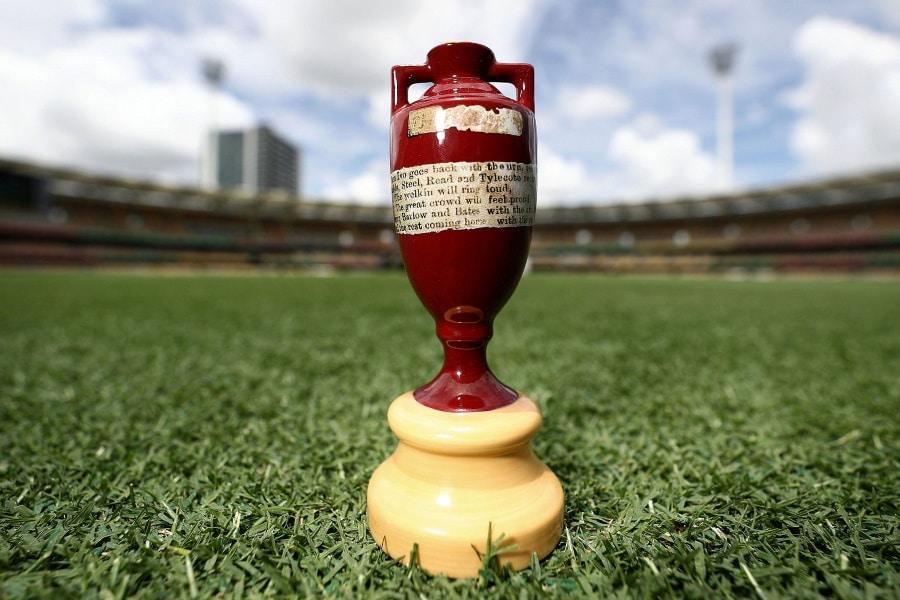Another volume of one of sport’s most celebrated narratives – The Ashes – will be written in England over the next six weeks. As bitter rivals England and Australia prepare for battle in the first Test at Edgbaston, Man of Many shares the top 10 greatest moments in The Ashes’ history.
Thommo and Lillee Terrorise Poms
Heading into the 1974-75 home Ashes series, Australia had not held the urn for six years. Bowling spearhead Dennis Lillee had not played for 18 months due to a career-threatening back injury and he was paired up with Jeff Thomson, who went wicketless in his only previous Test appearance two years earlier.
But Thomson’s terrifying pace garnered nine wickets in the first Test at the Gabba and set the tone for the series. The aggressive duo combined for 58 wickets across the five Tests as Australia powered to a 4-1 triumph, while both enforcers became icons of the era.
Bodyline
Easily the most infamous Ashes skirmish on record – and arguably in the history of Test cricket – England’s 1932-33 tour of Australia would become immortalised as the ‘Bodyline’ series. Also known as ‘leg theory’, England devised a tactic of hostile short-pitched bowling to intimidate the Australian batsman and negate the brilliance of the incomparable Don Bradman.
England captain Douglas Jardine was the chief villain and ferocious fast bowler Harold Larwood his henchman, striking Bill Woodfull on the chest and fracturing Bert Oldfield’s skull in the third Test at Adelaide Oval. The controversial methods had the desired on-field effect with England taking control of the series via a 338-run win, but Anglo-Australian relations reached an all-time low in the wake of the match.
The series was almost called off as the Australian Board of Control and the MCC sent enraged cable messages back and forth. Despite the bodyline approach – which many of the English players were opposed to – largely being shelved thereafter, the tourists won the remaining two Tests and clinched the Ashes 4-1.
Waugh’s Courage at The Oval
The Australian tourists had already wrapped up the 2001 series 3-1 heading into the fifth and final Test in London, but Steve Waugh was determined to play in the match despite suffering a painful calf injury in the fourth clash at Headingley. Not only did he play, but the skipper produced one of his greatest innings, top-scoring with 157 not out in a typically dogged display.
He shared in a 197-run stand with twin brother Mark as Australia amassed 4/641 declared. Shane Warne finished with 11 wickets in an emphatic victory by an innings and 25 runs, which gave Australia a 4-1 series triumph – equalling their best effort in England. It remains Australia’s last Ashes success in The Old Dart.
Laker’s 19-Wicket Haul
Surrey off-spinner Jim Laker produced a performance at Old Trafford during the 1956 Ashes destined to command a place in the record books for eternity. After taking a career-best 11 wickets in the previous encounter at Headingley, the 30-year-old singlehandedly dismantled Australia with 9/37 as the tourists crumbled to 84 all out in their first dig. With Australia following on, Laker then became the first bowler in Test history to claim every wicket in an innings, taking 10/53.
No bowler had managed more than 17 wickets in a first-class match – Laker became an instant icon with his astounding Test figures of 19/90. England took a 2-1 lead with their innings victory and retained the Ashes via a fifth-Test draw, while Laker finished with an Ashes series record 46 wickets at the ludicrous average of 9.60.
Badass Border Reroutes Australia’s Ashes Trajectory
The 1980s was a decade of more lows than highs for Australian cricket and Allan Border’s tourists headed to England derided as one of the weakest squads to leave our shores.
Australia had lost five of the previous six Ashes series but carved out a stunning 4-0 triumph. Scintillating individual performances abounded: Steve Waugh’s majestic centuries in the first two Tests; the injury-plagued Terry Alderman’s tally of 41 wickets (one short of his Australian Ashes series record set eight years earlier); newcomer Mark Taylor’s double-century among a series total of 839 runs – the most since Don Bradman in 1930. But underpinning Australia’s dominance was the hard-nosed, unrelenting leadership of Border.
Chastened by his team’s series losses on the 1985 tour and during the 1986-87 home summer, ‘AB’ put his foot on England’s throat from the outset and kept it there until the end of the campaign. When England batsman Robin Smith requested a glass of water during the fifth Test, Border famously replied: “No you fucking can’t, what do you think this is – a fucking tea party?”
Border cultivated a new attitude and a new era for the Australian cricket team, who did not lose the Ashes again until 2005.
Amazing Adelaide
Attempting to bounce back from a heavy first-Test defeat in 2006, England rattled up 6/551 declared in Adelaide with Paul Collingwood (206) and Kevin Pietersen (158) sharing in a mammoth 310-run partnership. Australia responded in kind, however, reaching 513 all out with captain Ricky Ponting (142) and Michael Clarke (124) the key contributors.
An England loss seemed incongruous when they began Day 5 leading by 97 runs with nine wickets in hand, but Shane Warne’s sizzling 4/49 and some outstanding pace bowling from Brett Lee (2/35) and Glenn McGrath (2/15) saw the tourists slump from 1/69 to 129 all out. Needing 168 for victory in the final session, the Aussies peeled the target off in just 32.5 overs as player of the match Ponting (49 off 65 balls) and Mike Hussey (61* off 66) transitioned into one-day mode.
The match was hailed as one of the greatest in Test history, but hapless England had unquestionably played the fall-guy role after posting the fourth-highest innings total in a losing effort. Australia regained the Ashes with a 5-0 series rout.
The Don’s Greatest Innings
There will never be another Don Bradman. His greatest Ashes moments could fill this entire list: a world record 334 at Headingley, along with two more double-centuries during the same 1930 series; a triple-century and a double-ton in consecutive Tests on the 1934 tour of England; unforgettable innings of 187 in Brisbane and 234 in Sydney in the first two post-World War II Ashes Tests in 1946. But arguably his finest Ashes knock came when Bradman was at one of his lowest ebbs.
Assuming the captaincy for the 1936-37 home series, Bradman struggled for batting form – recording two of just seven career ducks in back-to-back innings – as Australia lost the first two Tests, was off with his teammates and was being outwitted by opposing skipper Gubby Allen. But Bradman made an iconic 270 in the third Test at the MCG that wrested the momentum of the series in Australia’s direction, his seven-hour masterclass in grit and concentration paving the way for a 365-run win.
He scored 212 as Australia levelled the series in Adelaide and blasted 169 off 191 balls in the Ashes-winning innings victory back in Melbourne, but it was Bradman’s third-Test heroics that received the nod as the best batting performance in Test history by Wisden in 2001. ‘The Don’ scored 19 centuries (including six doubles and two triples) in 37 Ashes Tests spanning 20 years.
Botham’s Ashes
Mercurial, charismatic England all-rounder Ian Botham established his legend in the 1981 home Ashes series. England was down 1-0 after two Tests and forced to follow on during the third encounter at Headingley. But a masterful 149 not out off 148 balls from Botham – who had been replaced as captain prior to the match – swung the series.
Chasing a modest 130 for victory, Australia crumbled to 111 all out (thanks largely to Bob Willis’ searing 8/43) to become just the second team in Test history to lose after enforcing the follow-on. ‘Beefy’ Botham was unstoppable from that point: he took 5/11 to bowl Australia out for 121 and clinch a 29-run win for England in the fourth Test; blasted 118 off 102 balls at Old Trafford to help seal the series with a 103-run victory; and claimed 10 wickets in the drawn sixth Test at The Oval.
Ball of the Century
Shane Warne had played 11 Tests with moderate success when he was chosen in Australia’s 1993 squad to tour England. The 23-year-old leggie ambled up to the crease in the opening Test at Old Trafford for his first Ashes delivery – and bowled England stalwart Mike Gatting with arguably the greatest dismissal of all time.
Warne pitched the ball well outside leg stump but it bit into a rough patch and turned sharply across Gatting, missing his outside edge and clipping the top of off stump. The brash Victorian finished with eight wickets for the match and 34 scalps in a 4-1 series thrashing – before carving out a legacy as arguably the most dominant Ashes performer since Bradman. ‘Warnie’ took a record 195 wickets in 36 Ashes Tests, including 11 five-fors and four 10-wicket matches.
The Closest Ashes Test
Australia arrived in England in 2005 on the back of eight straight Ashes series successes, with Ricky Ponting leading a squad bursting at the seams with all-time greats: Warne, McGrath, Hayden, Langer, Gilchrist, Lee et al. Another demoralising defeat loomed for England when they lost the first Test by 239 runs. But the archrivals played out one of the best-ever Test matches in the next clash at Edgbaston.
England crafted a 99-run first-innings lead, but left Australia with a target of 282 after Shane Warne tore through the hosts’ line-up in the second innings. The tourists were on the ropes at 9/220, but Brett Lee and Michael Kasprowicz produced a stunning last-wicket rearguard action. With only three runs required for victory, Kasprowicz edged Steve Harmison to keeper Geraint Jones to seal the closest result in Ashes history.
England all-rounder Andrew Flintoff consoling a gallant-but-crestfallen Lee remains one of the most enduring of all Ashes images. The victory provided the impetus for England to achieve a famous 2-1 series win – and they have not lost the Ashes on home soil since.































Comments
We love hearing from you. or to leave a comment.